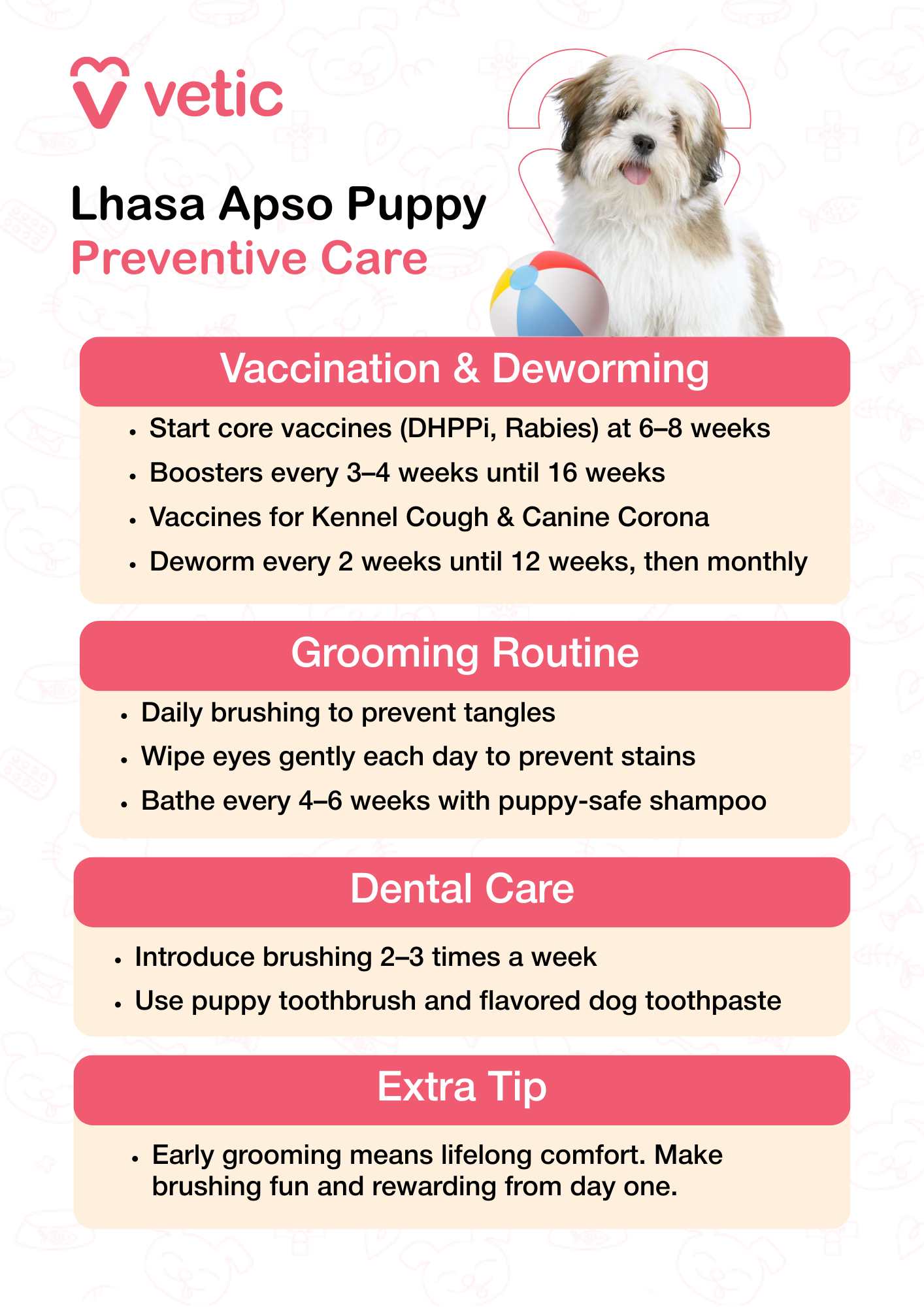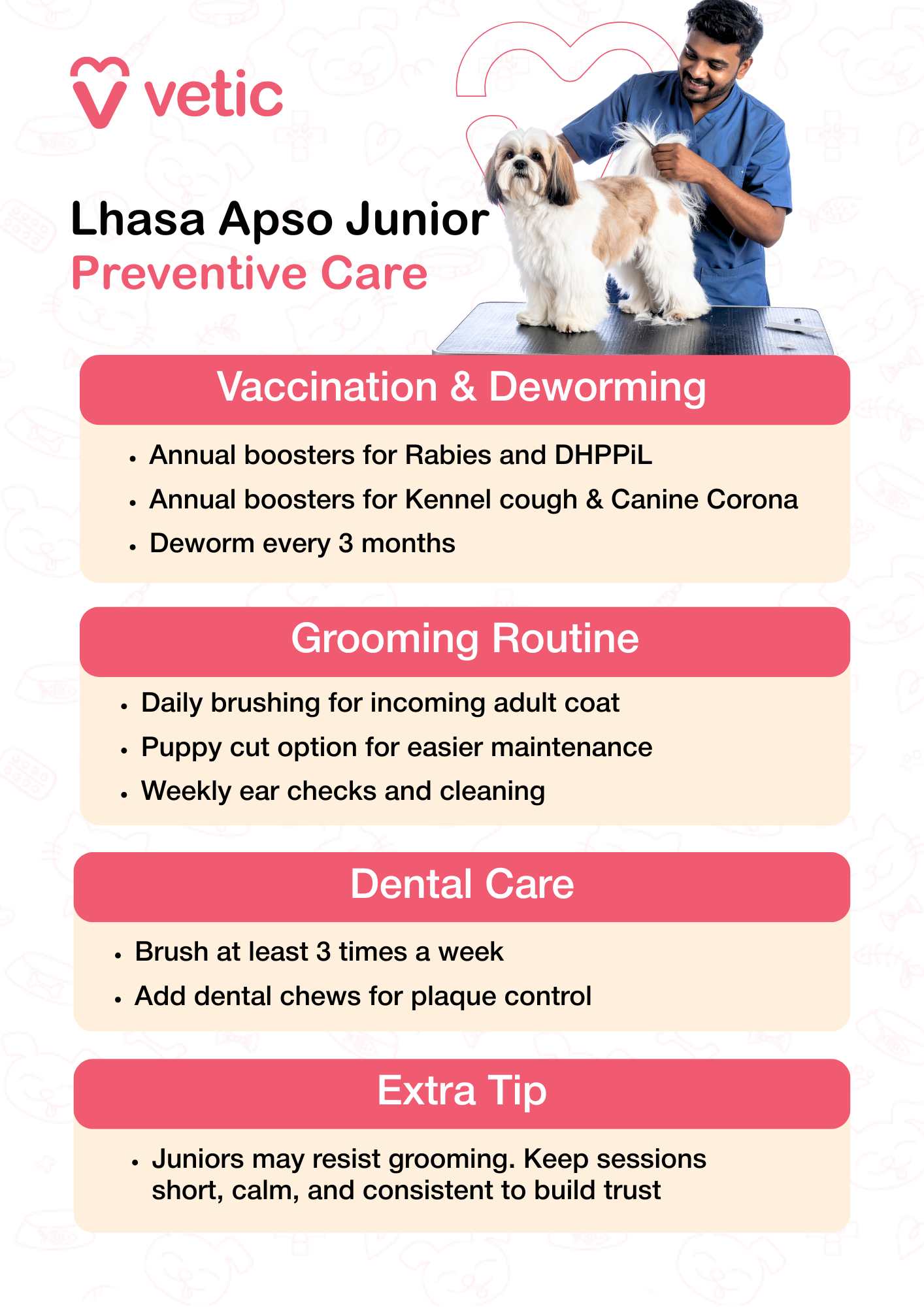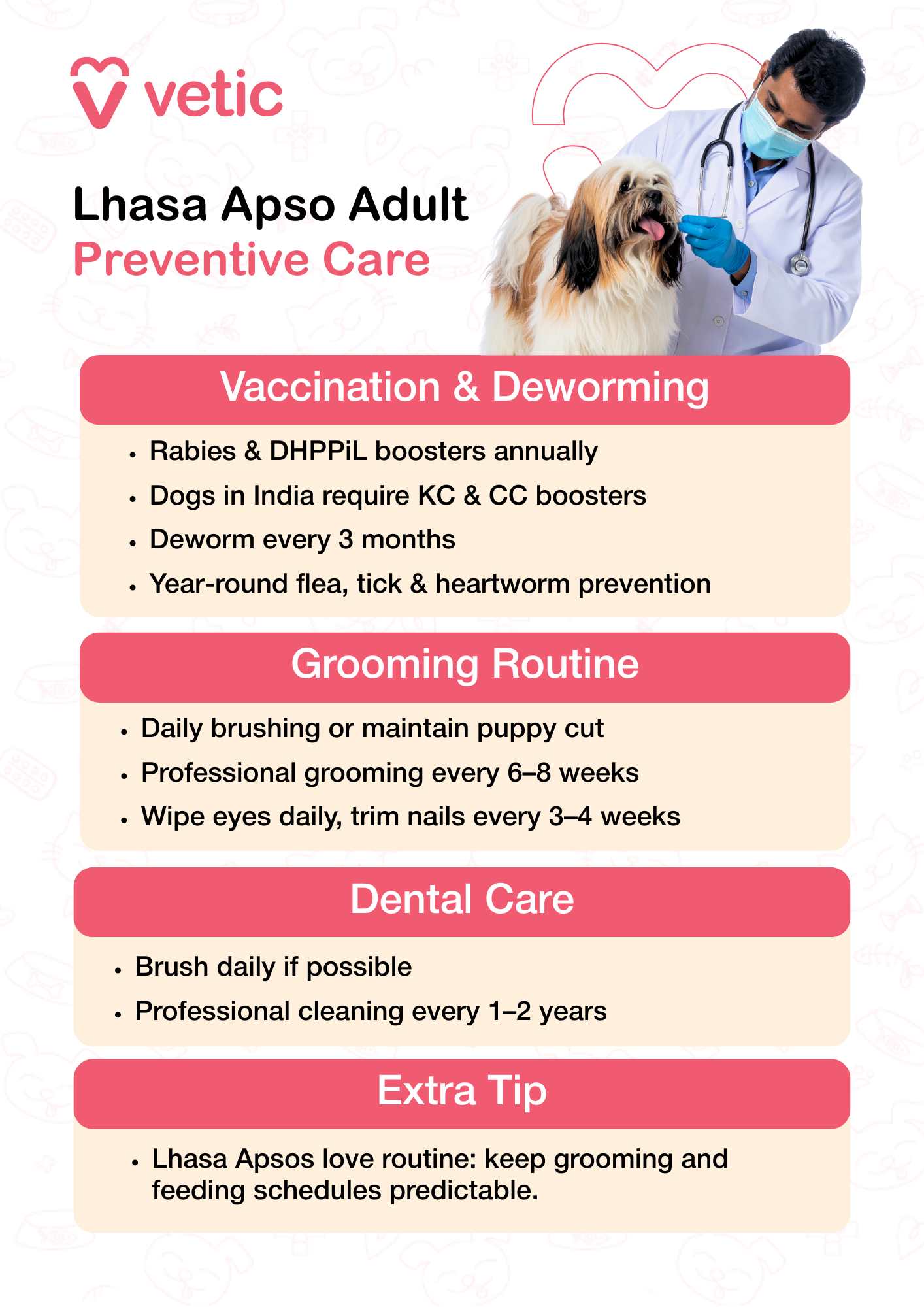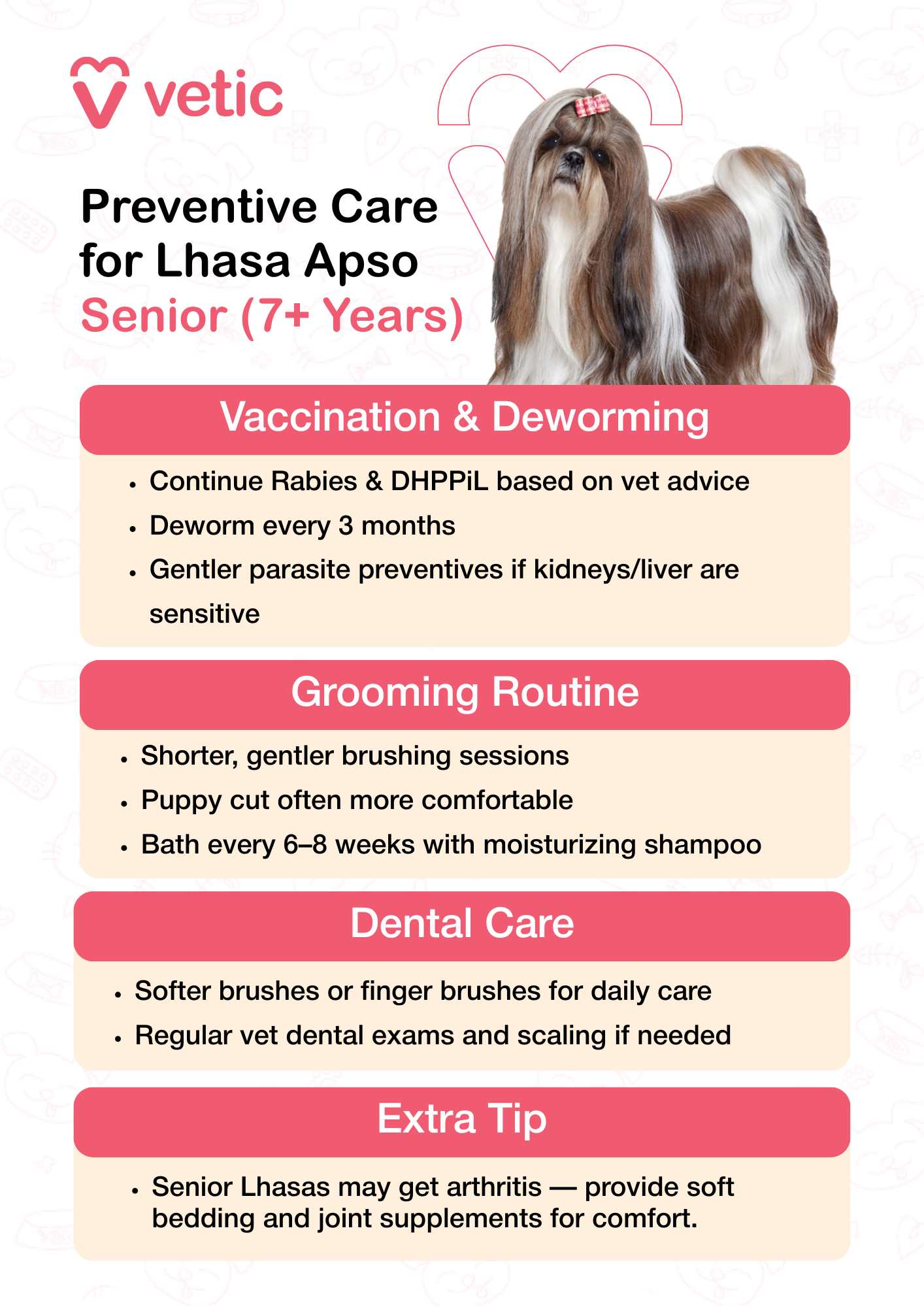The Lhasa Apso is more than just a small dog with a long, flowing coat. This breed carries centuries of history, once guarding Tibetan monasteries with its sharp bark and alert nature. Today, Lhasas are beloved family companions known for their dignity, loyalty, and sometimes stubborn streak.
But while their charm is undeniable, Lhasas also come with special care requirements. Their short stature, dense double coat, short muzzle, and protruding eyes make them prone to certain health issues that require breed-specific preventive care. Preventive care means everything you do to keep your Lhasa healthy before illness strikes; from vaccines for Lhasa apso pups and deworming to grooming, dental care, and lifestyle adjustments.
Let’s walk through preventive care across the four life stages of the Lhasa Apso: puppy, junior, adult, and senior. Along the way, we’ll highlight little nuggets that make life easier for pet parents.
Grooming to Complete Vaccines for Lhasa Apso Puppy (2–12 Months)

Grooming of Lhasa Puppy
Your puppy’s coat will grow quickly and tangle easily. Daily brushing helps keep knots at bay and also gets your puppy used to grooming early. Bathing once every 4–6 weeks with a mild puppy shampoo is enough. Their protruding eyes often water — wipe gently with a damp cloth daily.
Deworming for Lhasa Puppy
Deworming Lhasa puppies should start early: every 2 weeks until 12 weeks, then monthly until 6 months. Roundworms, hookworms, and tapeworms are common in young pups.
Vaccination of Lhasa Apso Puppy
Puppyhood is when your Lhasa is most vulnerable to disease. Core vaccines for Lhasa pups are DHPPiL (distemper, parvovirus, hepatitis, parainfluenza and leptospirosis) and Rabies. Other essential vaccines, like kennel cough and canine corona may be recommended if your puppy will be socializing in classes or boarding environments. Vaccines are typically given every 3–4 weeks until 16 weeks of age.
Dental Care for Puppy Lhasa
Small breeds like Lhasas are prone to dental disease. Begin brushing 2–3 times a week with a puppy toothbrush. Make it fun and rewarding so your Lhasa associates it with playtime.
Parent Tip: Tear stains are common in Lhasa puppies. Don’t panic — just clean gently every day, and it will become part of your routine.
Grooming, Deworming and Vaccines for Lhasa Apso Junior (6–18 Months)

Grooming for Junior Lhasa
This is when your Lhasa’s adult coat comes in — and daily brushing is a must to prevent painful mats. Many pet parents opt for a puppy cut, a shorter trim that makes grooming more manageable. Eyes and ears need weekly checks and cleaning. Keep hair out of the eyes to avoid irritation and ulcers.
Deworming for Lhasa Junior
From this stage onward, deworming can be done every 3 months, unless your vet suggests otherwise.
Vaccination for Lhasa Apso Junior
By this age, your Lhasa will have completed their puppy series, but booster shots are still essential. Annual Rabies and DHPPi vaccines are often recommended, though some may be given every three years depending on your vet’s advice. Other essential vaccines, such as canine corona or kennel cough, may be needed for dogs that travel or socialize often.
Dental Care
Brush teeth 3 times a week at minimum. Dental chews or toys designed for small breeds can help manage plaque.
Parent Tip: Your junior Lhasa may test boundaries — including during grooming! Keep sessions short, gentle, and positive so they learn to enjoy it.
From Grooming to Vaccines for Lhasa Apso Adult (18 Months – 7 Years)

Grooming for Lhasa Adult
The adult Lhasa’s coat is at its most glorious and demanding. Daily brushing is essential to prevent mats. Professional grooming every 6–8 weeks keeps the coat manageable. Regular eye wiping protects against irritation. Nails should be trimmed every 3–4 weeks.
Deworming & Parasite Prevention for Adult Lhasa
Deworming every 3 months remains important. In addition, flea, tick, and heartworm prevention should be used year-round, especially in warm or humid climates.
Vaccination for Lhasa Apso Adult
Adult Lhasas need ongoing protection. Core vaccines such as Rabies and DHPPiL, along with kennel cough and canine corona, are given annually.
Dental Care
Dental hygiene becomes more critical in adulthood. Daily brushing is ideal, and professional cleanings every 1–2 years may be needed.
Parent Tip: Lhasas thrive on routine. Grooming at the same time every day, walks at the same hour. Predictability comforts them.
Grooming to Vaccines for Lhasa Apso Senior (7+ Years)

Grooming for Senior Lhasa Dog
Seniors may not tolerate long grooming sessions. Keep brushing short and gentle. A puppy cut often works best for older dogs. Bathe every 6–8 weeks with a moisturizing shampoo. Their eyes and ears become more delicate with age — clean gently.
Deworming & Parasite Control
Deworming every 3 months continues, though some seniors with sensitive stomachs may need gentler options. Flea, tick, and heartworm prevention remain important, but your vet may suggest tailored products depending on liver and kidney function.
Vaccination for Lhasa Senior
Your vet may adjust the vaccine schedule based on your senior Lhasa’s health. Core vaccines are usually continued, but optional vaccines are given only if there’s an exposure risk.
Dental Care for Lhasa Dog Senior
Many senior Lhasas need professional dental scaling. Brushing may need to be adapted with softer brushes or finger brushes. Dental care is crucial for preventing infections that affect the heart and kidneys.
Parent Tip: Senior Lhasas often develop arthritis. Provide soft bedding, joint supplements, and keep grooming sessions short to reduce stress.
Grooming to Vaccination for Lhasa Apso: All Life Stages
Preventive care for a Lhasa Apso is about being proactive, not reactive. From puppyhood through senior years, regular vaccinations, deworming, coat and eye care, dental hygiene, and vet visits form the backbone of a healthy life.
For this long-lived breed, preventive care is what ensures your little guardian ages gracefully, stays comfortable, and continues to brighten your days with loyalty and affection.
By tailoring preventive care to their unique traits — their coat, stature, muzzle, and eyes — you’re giving your Lhasa not just years of life, but life full of quality.
FAQs on Lhasa Apso Preventive Care
Q1: What vaccines for Lhasa Apso puppies are most important?
Core vaccines for Lhasa Apso puppies including Rabies, DHPPiL, kennel cough, and canine corona, may be recommended.
Q2: How often should you deworm Lhasa puppy?
Deworming Lhasa puppy is needed every 2 weeks until 12 weeks, then monthly until 6 months, then quarterly.
Q3: What is the best Lhasa puppy grooming routine?
Lhasa puppy grooming should include daily brushing, eye wiping, and monthly baths to prevent mats and protect sensitive eyes.
Q4: How often should vaccines for Lhasa Apso adults be given?
Vaccines for Lhasa Apso adults are typically given annually or every three years, depending on your veterinarian’s advice.
Q5: Do Lhasa Apsos need professional dental care?
Yes, dental care for Lhasa Apsos should include daily brushing and professional cleanings every 1–2 years for optimal health.
Q6: How important is grooming for senior Lhasa Apsos?
Senior Lhasa Apso grooming should be gentle, with short brushing sessions and puppy cuts for comfort and skin health.
Q7: What preventive care supports eye health in Lhasa Apsos?
Daily eye wiping, trimming hair around the eyes, and routine vet checks prevent infections in protruding Lhasa Apso eyes.
Q8: What is a safe feeding and preventive routine for senior Lhasas?
Senior Lhasas need two small meals daily, joint supplements, deworming, grooming, and routine vaccines for Lhasa Apso protection.
References
American Kennel Club. (n.d.). Lhasa Apso dog breed information. American Kennel Club. Retrieved from https://www.akc.org/dog-breeds/lhasa-apso/
Hill’s Pet Nutrition. (n.d.). Lhasa Apso dog breed – facts and information. Hill’s Pet. Retrieved from https://www.hillspet.com/dog-care/dog-breeds/lhasa-apso
Royal Canin. (n.d.). Lhasa Apso nutrition and care guide. Royal Canin. Retrieved from https://www.royalcanin.com
The Kennel Club. (n.d.). Lhasa Apso. The Kennel Club (UK). Retrieved from https://www.thekennelclub.org.uk
Cornell University College of Veterinary Medicine. (n.d.). Canine preventive healthcare. Cornell Vet. Retrieved from https://www.vet.cornell.edu
VCA Animal Hospitals. (n.d.). Dental care for dogs. VCA. Retrieved from https://vcahospitals.com/know-your-pet/dental-care-for-dogs

